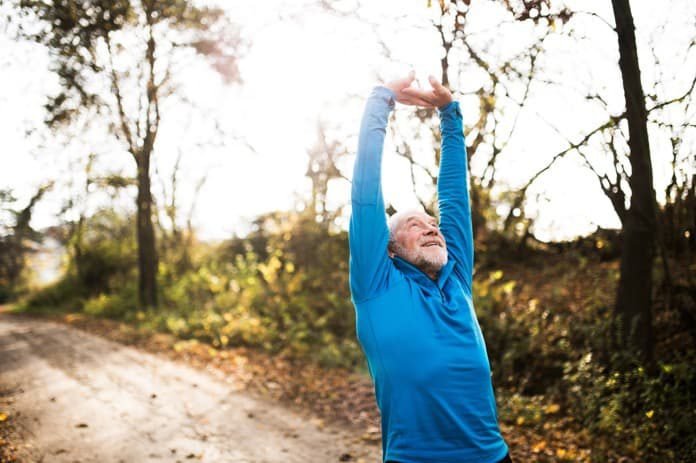A study presented at the Joint Hypertension 2018 Scientific Sessions looked at how to lower blood pressure without medication through lifestyle changes.
Hypertension is a condition commonly known as high blood pressure.
Its diagnosis is very prevalent, with nearly one in two Americans surpassing the recently amended high blood-pressure limits of 130/80 mmHg.
The first number in a blood pressure reading is the “systolic pressure”, which is the pressure felt by the blood vessels when the heart powerfully contracts.
The second number the “diastolic pressure”, which is the blood vessel pressure when the heart muscles are relaxed, and the heart chambers fill with blood.
Healthy blood pressure is considered to be at 120/80 mmHg or slightly below.
Few studies have looked at the combination of exercise and diet on cognition and blood pressure
High blood pressure can increase the risk of other serious conditions such as dementia, stroke, and heart attacks. High blood pressure medication is primarily used as treatment.
However, there is interest in how to lower blood pressure without medication, and other lifestyle changes have shown strong benefits.
Exercise and diet have been generally known to have a positive effect on the body. Yet, no studies have precisely looked at the combination of cardiovascular exercise and diet on cognition and blood pressure – until now.
Academics in North Carolina, United States presented their research on how to lower blood pressure without medication at the Joint Hypertension 2018 Scientific Sessions, which is the American Heart Association’s annual conference.
Their research showed how healthy eating, regular exercise, and behavioral counseling can significantly reduce blood pressure.
The study included 129 men and women diagnosed with high blood pressure and either a condition of overweight or obesity. The subjects were between 40 and 80 years of age.
They also had blood pressures over 130/80 mmHg and were not using medications to reduce it.
For the study, the researchers randomly assigned the participants to one of three intervention groups for 16 weeks. One group involved only diet changes with a nutritionist’s guidance.
The second group had diet changes, a weight management program, and weekly supervised exercise.
The last group did not have any diet or nutritional change (no intervention). The Dietary Approaches to Stopping Hypertension (DASH) plan defined dietary intervention.
This diet focuses on increased vegetable, fruit, and low-fat dairy intake while reducing red meats, salt, cholesterol, and artificial sugars.
Adults who exercised and followed the dietary intervention had the greatest reductions in blood pressure
The researchers found the adults who followed the DASH diet, exercised, and had behavioral weight management therapy had the greatest reduction in blood pressure.
On average, they lost 19 pounds in weight and reduced their systolic pressure by 16 mm Hg and diastolic pressure by 10 mm Hg.
They also showed the greatest improvements in memory and response speed with changing environmental stimuli. By the end of the study, only 15% of the subjects needed to use medical treatments to control their blood pressure.
Following the diet without exercise also lowered blood pressure
Following close behind in improvements was the diet-only intervention.
These subjects lowered their systolic pressure by 11 mm Hg and diastolic pressure by 8 mm Hg. This correlates to 23% of the group requiring medication by the end of the study.
Adults who had neither diet nor exercise interventions showed little improvement; their blood pressure was reduced by 3 systolic/4 diastolic mm Hg.
Exercise and diet changes may be just as effective as medication
Unfortunately, because this study was limited to four months, the long-term benefit of such lifestyle changes could not be observed.
Due to the nature of the intervention groups, the overall benefits cannot be said to be due to exercise, the DASH diet, or behavioral counseling; it is only known that these three changes together are helpful. Also, the cognitive benefits cannot be accounted for by any one factor.
Overall, the study showed how to lower blood pressure without medication through exercise and dietary changes. Exercise and diet changes are useful tools that may be just as effective as medication.
There is also the added benefit of cognitive strength. We can expect more research on this topic in the future.
Written by Amrita Jaiprakash, MSc
Relevant topics that may be of interest to you:
- Antidepressants may increase the risk of high blood pressure during pregnancy
- Does high blood pressure increase the risk of miscarriage?
- Can a common blood pressure drug improve ovarian cancer treatment?
- Could blood pressure treatment be harmful to older seniors?
- Is poor oral health linked to worse blood pressure control?
- Nitrate-rich Vegetables and the Lowering of Blood Pressure Myth
References:
- Smith et al. Effects of the dietary approaches to stop hypertension diet, exercise, and caloric restriction on neurocognition in overweight adults with high blood pressure. Hypertension. 2010;55:1331-1338.
- Lifestyle changes reduce the need for blood pressure medications | American Heart Association. (2018). Retrieved from https://newsroom.heart.org/news/lifestyle-changes-reduce-the-need-for-blood-pressure-medications?preview=202d



